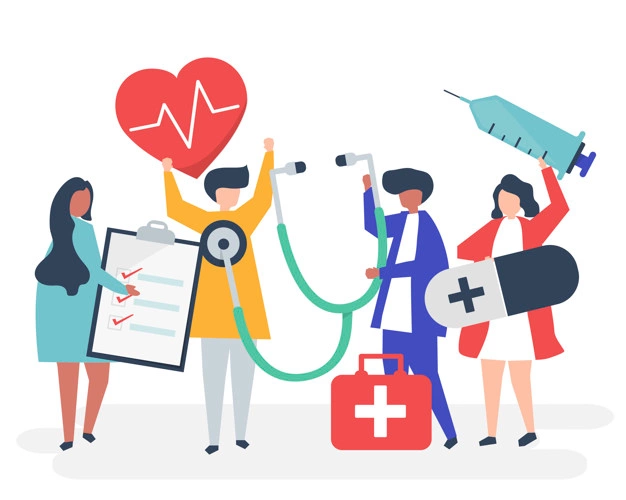The Healthcare Industry
It can be argued that no other industry has been as severely impacted by COVID-19 as the healthcare industry.
The industry is under siege. Some of the key factors that make this industry so challenging are its size and complexity.
Apart from front line health care workers, we have pharmaceuticals, medical specialties, R&D, equipment manufacturers, financial and medical insurance, health care education, public health services, technology, supply chains, disease control organizations like WHO and CDC, just to name a few.

Trends
COVID-19 has transformed the industry and accelerated numerous existing and/or emerging health care trends.
Here is a summary of the key trends emerging in the industry :
Executive Concerns : continuing to address the pandemic will be critically important in 2024 and ahead. At the top of concerns going forward for health care executives are rapidly evolving digital health technologies, integration of life sciences, new talent, clinical innovation and emerging care delivery models.
Competition : whoever is first to capture the consumer will have a key advantage to influence other parts of the health ecosystem.
Patient and Worker Experience : this sector is elevating the human experience of patients as well as the workforce as it reshapes what, how, and where healthcare is performed.
Technology : technological advancements, cultural shifts, cost of care, and policy adjustments continue to have strong impact on our patient-centered healthcare system.
Clinicians' Experience : most healthcare executives agree that improving the clinician experience is a priority for their organizations as they enter the new post-pandemic age.
Complex Changes : the sector is transforming to meet the new challenges of climate change, public health policy changes, changes in remote working, virtual doctor visits, and a supply chain marked by shortages of medical supplies, personnel, and services.
These trends are expected to continue well into the future as new healthcare electronic technologies, such as 3D printing, wearable biometric devices, and GPS tracking, are tested and introduced into clinical use.
Challenges
The core mission of public health is to protect and promote the health of all people in all communities.
Some of the major challenges the industry faces are :
Organizational Restructuring : reshaping health portfolios for growth
Human Resources : scarcity, new skills, high turnover
Environmental Change : adjusting to the impact of climate change on health and well-being
Climate change : this is the greatest global health threat facing the world in the 21st century
Innovation : translation from the academic into the practical at scale and at speed
Telehealth Explosion : with telehealth going mainstream as a byproduct of the pandemic, the industry is also challenged to meld the virtual and in-person care worlds in a bigger way than ever.
Equity : health equity is emerging as one of the most important issues of our times and not just for health care organizations. Health equity is more than equitable access to care. It is the ability to fulfill our human potential in all aspects of health and well-being. It’s an opportunity to achieve an overall state of well-being encompassing clinical, mental, social, emotional, physical, and spiritual health, and it is influenced by not just health care, but also social, economic, and environmental factors.
Supply Chain : building a resilient and responsive supply chain for long-term health
Digital : encouraging digital relationships that ease physician burdens
Forecasting : better forecasting for an uncertain event
Medical Advances : keeping pace with new developments in medical science and changing clinical trials.
The corona virus is not expected to disappear anytime soon. Despite continuing challenges on multiple fronts, there is a growing optimism that the industry is now better equipped to manage the impact going forward.
Digital Technologies
Digital Transformation : this is playing a key role in changing the industry as both healthcare organizations and public health systems are reinventing themselves in the wake of COVID-19. From targeted applications to entire smart cities, all are playing an important role in transformations.
Telemedicine : this has come to the fore during the pandemic. Although it is unlikely to replace in-person care, it is expected to grow an important alternative
Mental Health : as this topic gains more attention, digital technologies are showing great potential to transform mental and behavioral health systems globally. It will be more accessible, affordable, scalable and purposeful
Coordination and Integration : with growth in telemedicine, better ways of integrating virtual patient visits into a care pathway makes for improved care and reduces dropped handoffs. Tying virtual to in-person seamlessly is important for reducing leakage and maintaining ancillary services, follow-up appointments and prescription levels
Partnerships : healthcare organizations' primary expertise is in delivering proper healthcare to its customers. Partners versed in digital technologies to chart a successful path into the future of their organization is highly recommended.
Looking Ahead
As climate change’s influence continues to increase, health care leaders will need to build resilience into their facilities, systems, and workforce to withstand natural disasters such as floods, drought, fires, and storms. Doing so will largely reduce long-term risks.
Executives and technologists are also preparing for how high-speed connectivity, including 5G telecommunications, will transform virtual health usage, with wide-scale deployments expected in the next three-to-five years.
Experiences from COVID-19 has increased the appetite for change across the healthcare industry. Sponsors, contract research organizations and patients noted benefits in a more decentralized model.
The real legacy of the pandemic is a catalyst to initiate and accelerate many of the long-standing challenges and opportunities arising from core issues facing the global health care sector.

The experience of the pandemic showed the need for healthcare leaders to move from a retrospective view fed by historical trends and past claims to a prospective view based on real-time information, both clinical and nonclinical.
WorkforceAI
WorkforceAI meets the challenges of IT transformation in healthcare by facilitating the creation and management of multiple teams working collaboratively and remotely.
Our process can lower costs and reduce time-to-market while retaining production quality, even in large projects delivering fully operational healthcare systems.
Contact Us
Contact us today for a free consult on making your projects more agile and responsive.
